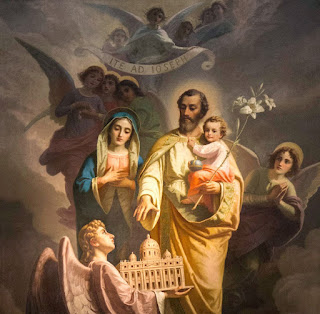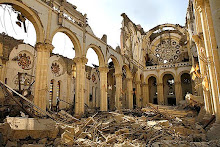The feast of St Joseph, Patron of the Universal Church, was originally called “the Patronage of St Joseph,” and fixed to the Third Sunday after Easter. It was kept by a great many dioceses and religious orders, particularly promoted by the Carmelites, before it was extended to the universal Church by Bl. Pope Pius IX in 1847, and later granted an octave. When the custom of fixing feasts to particular Sundays was abolished as part of the Breviary reform of Pope St Pius X, it was anticipated to the previous Wednesday, the day of the week traditionally dedicated to Patron Saints. It was removed from the general Calendar in 1955 and replaced by the feast of St Joseph the Worker, one of the least fortunate aspects of the pre-Conciliar liturgical changes; the new feast itself was then downgraded from the highest of three grades (first class) in the 1962 Missal to the lowest of four (optional memorial) in 1970.
newliturgicalmovement.org/2024/04/the-soWPATH, or the World Professional Association for Transgender Health, is respected as the peak body for transgender medicine. Its “standards of care” (SOC) were once regarded as a benchmark for ethical and effective treatment for minors and adults. The eighth edition (SOC8) , which was released in 2022, has been translated into ten languages.
Its prestige, however, has been tarnished by the leak of hundreds of posts from an internal messaging forum. These are evidence of doctors basing their surgery, even on young people, on trial and error, not on medical research. The internet went wild over the leak. The Times of London called WPATH quack medicine, and Diplomate of the American Board of Psychiatry and Neurology Lauren Schwartz, MDstated: “WPATH has evolved into one of the most egregious disfigurements of medical practice our profession has ever encountered.”
However, the real scandal emerges not just in leaks of confidential discussions but in what is publicly known about WPATH’s authorized procedures. The word “kinky” comes to mind over and over again. I wonder if President Joe Biden had these in mind in his message to the trans community on Easter Sunday: “You are loved. You are heard. You are understood. You belong. You are America, and my entire Administration and I have your back.”
The President of the United States has endorsed what is effectively a nationwide program of sexual lobotomies. This is completely nuts.
Here are some of the fetish-appeasing surgeries that WPATH is pushing.
Non-binary
Chapter 8 in SOC8 is devoted to treatment of non-binary people, who desire to appear neither male nor female. WPATH surgeons are ready to comply with their demands. One problem is that there is no agreed definition of what “non-binary” means – and therefore of what treatment may be needed. In fact SOC8 acknowledges that “At times, nonbinary people find themselves educating the provider from whom they are seeking services despite the inappropriateness of providers relying primarily on their patients for education.”
Is this medicine or is it making it up as you go along?
Prior to the latest WPATH guidance, “bottom surgeries” were limited to binary surgical options such as vaginoplasty (creating an open wound to be used as a vaginal canal) or phalloplasty (constructing a non-functional penis). However, WPATH shifted to accommodate the emerging trend of individuals who prefer a “queer” identity that does not conform to either male or female biological sex classifications. These surgeries cannot remotely be construed as medically necessary. Gender-queer “identities” can include eunuchs, gendervoids, demi boys, pangender etc, etc. There are customized surgeries for them all.
Eunuchs
Chapter 9 in SOC8 is devoted to eunuchs. Eunuchs? You might have thought that the last eunuch died when the last Turkish sultan closed his harem. But no, some fetishists want to be castrated. WPATH doesn’t regard this as a psychological problem.
SOC8 welcomes eunuchs under its “gender diverse umbrella”. This kind of surgery is deemed legitimate because otherwise clients will engage in sado-masochistic “actions that may cause them great harm,” ie, self-castration. There are apparently two types of eunuch surgery: one removes the testicles (bilateral orchiectomy) and the other eliminates the penis (penectomy).
Speculating on the inclusion of the infamous eunuch chapter, Canadian psychologist Jordan Peterson, in conversation with journalist Michael Schellenberger, who released the files, suggests sadism very likely provided the impetus.
Nullifications
An even more radical variety of non-binary surgery is nullification, which results in an absence of external primary sexual organs.” This “Barbi smoothie” surgery entails “amputating genitals for a smooth, sexless appearance.” The idea is to achieve a “flat front” or genital-free torso preserving only urethral and anal openings.
After a double mastectomy, females identifying as nonbinary typically request the skin nipple grafts be destroyed, modified, or moved out of normal alignment. Additionally, they may request some portion of breast mound tissue be retained to allow for day-to-day “fluid” shifts in gender moods. Nullification surgery for a female sacrifices her vagina together with the clitoris and labia.
Now for something completely different
The idea of a “sex change” is essentially binary and therefore old-fashioned. There are only two sexes, so there are only two possible sex changes – male to female and female to male. A gender fluid world opens up a whole spectrum of possibilities. Let me quote this paragraph from SOC8:
“Additional surgical requests for nonbinary people [assigned male at birth] include penile-preserving vaginoplasty, vaginoplasty with preservation of the testicle(s), and procedures resulting in an absence of external primary sexual characteristics (i.e., penectomy, scrotectomy, orchiectomy, etc.).”
WPATH Surgeon Dr. Thomas Satterwhite brags in the leaked files of his willingness to undertake these kinky surgeries:
“I’ve performed mastectomies without nipples, or have created chests with varying degrees of remaining breast tissue, or created incision patterns specific to my patient’s wishes. For bottom surgery, I’ve performed minimal-depth vaginoplasties(vulvoplasties), phallus-preserving vaginoplasties, and nullificationprocedures. I’m quite comfortable tailoring my operations to serve the needs of each patient.”
In other words, you can have bespoke genitalia. A particularly repugnant example is bigenital surgery (penile-preserving vaginoplasty). Yes, this is a Thing. Some folks want both male and female sex organs.

















